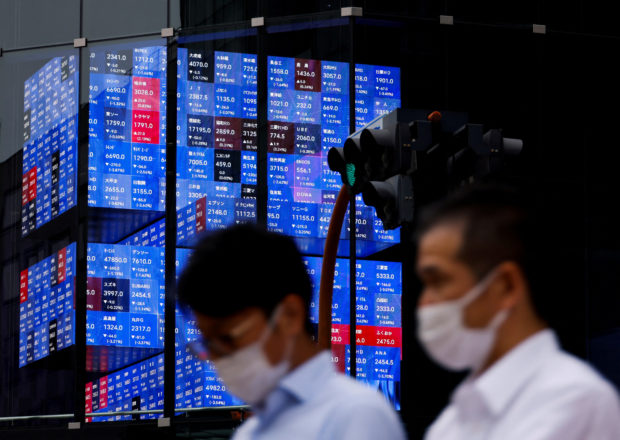Asian stocks flat as investors await more rate action

FPeople pass by an electronic screen showing Japan’s Nikkei share price index inside a conference hall in Tokyo, Japan. REUTERS/Issei Kato/File Photo
HONG KONG – Asian shares largely wiped out morning gains on Tuesday afternoon, as investors remained cautious ahead of a European Central Bank meeting this week while also watching out for fallout from Russia’s gas cut.
U.S. stocks are set to open higher on Tuesday after Monday’s Labor Day recess, with E-mini futures for the S&P 500 index up 0.31 percent.
FTSE futures however were down 0.2 percent, indicating a choppy start in London. European stock indexes fell on Monday, the euro dropped below 99 cents for the first time in twenty years and European gas prices surged after Russia said its main gas supply pipeline to Europe would stay shut.
MSCI’s gauge of Asia-Pacific stocks outside Japan was up 0.02 percent at 0532 GMT. Japan’s Nikkei 225 was 0.03 percent higher.
China’s benchmark CSI300 Index rose 0.58 percent, after the country’s policymakers pledged on Monday to make renewed efforts to boost the COVID-hit economy. Hong Kong’s benchmark Hang Seng Index, however, slid 0.07 percent.
Article continues after this advertisementThe yuan also rebounded from a more than two-year low against the U.S. dollar, after the central bank said it would cut the foreign exchange reserves ratio to support the currency.
Article continues after this advertisement“Bulk commodities will be dependent on the impact of Chinese stimulus and the success of this will be reflected in the major miners,” said John Milroy, an investment adviser at Ord Minnett.
Australia’s S&P/ASX 200 fell 0.36 percent, after the Reserve Bank of Australia (RBA) expectedly increased the cash rate by 50 basis points.
The European Central Bank will meet on Thursday to discuss interest rate actions. A U.S. Federal Reserve meeting will follow on Sept. 21.
“Soaring inflation will likely see the ECB deliver another outsized rate hike this Thursday,” said analysts from the Commonwealth Bank of Australia.
European energy ministers are set to discuss measures to curb power prices when they hold an emergency meeting on Friday.
“There is a feeling that the next 75 bp hike in September will see a deceleration afterwards,” said Sean Darby, Hong Kong-based global head of equity strategy for Jefferies.
Oil prices slipped on Tuesday, paring the previous session’s 3 percent gain, as a deal among members of the OPEC+ group to cut output by 100,000 barrels per day in October was seen as a largely symbolic move to stem the market’s recent slide.
Brent crude futures fell 0.7 percent to $95.07 a barrel, widening morning losses. U.S. crude futures however were still up 2.12 percent at $88.71 a barrel.
Spot gold rose 0.49 percent to $1,718.2 an ounce.
The dollar index inched down 0.06 percent after touching a 20-year peak in the previous session.